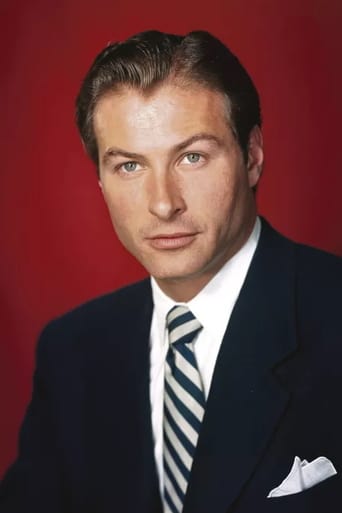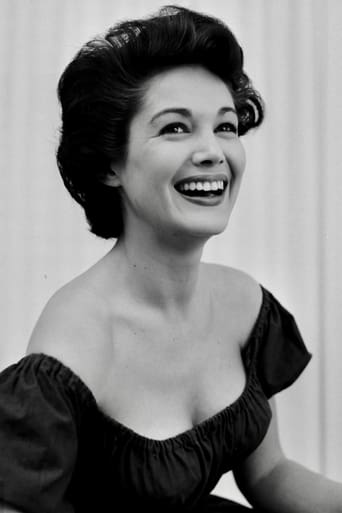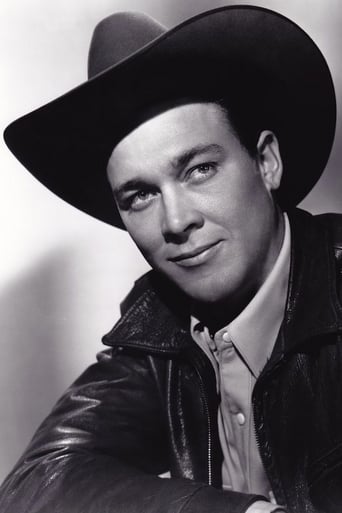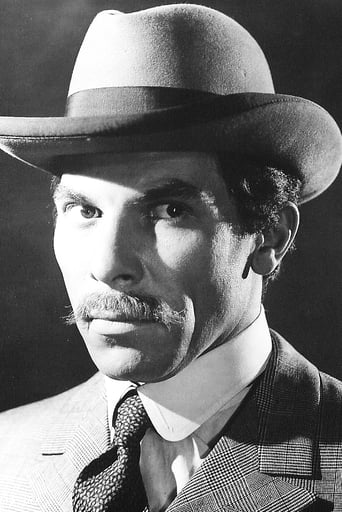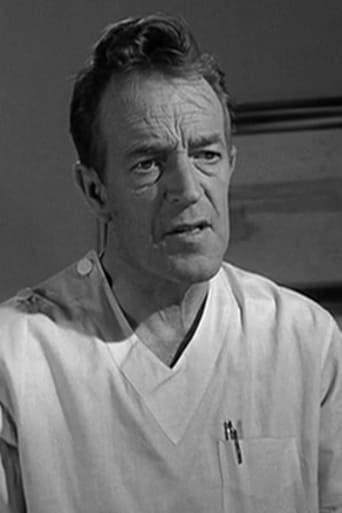Lucybespro
It is a performances centric movie
Ceticultsot
Beautiful, moving film.
Teringer
An Exercise In Nonsense
Odelecol
Pretty good movie overall. First half was nothing special but it got better as it went along.
whitec-3
If you don't expect more than a small-time western from the 1950s can deliver, War Drums proves a pleasant and honest but minor genre and period piece with three strong actors in the leads, some specific historical contexts (though as BKLoganbing notes, inaccurate Apache history), and a reasonably adventurous approach to gender and ethnicity.The action concerning white encroachment on Apache lands in Nevada territory takes place simultaneously with the start of the Civil War. Cowboy-lead Luke Fargo, played by the ever-likable Ben Johnson, compares American Indian reservations to African American slavery and to the traffic in Mexican women among Indians and Americanos. When Fargo's friend, Apache Chief Mangas (a.k.a. Red Sleeves, played by former Tarzan beefcake Lex Barker), attacks illegal American mining camps in 1861, he shares headlines with the Confederate attack on Fort Sumter. By the end of the movie Fargo is a major in the Grand Army of the Republic.Most impressive and interesting is Joan Taylor (a regular in 50s-60s westerns and sci-fi) as Riva, whose mixed blood leads to gender innovations. She first appears as a captive servant (and maybe more) of Mexican banditos. When Mangas raids the Mexican camp, Riva impresses him with her fighting spirit, and soon Fargo too falls for the fiery-sweet woman, who is referred to alternately as Mexicano and Americano. (She later reveals her father was Americano and her mother full-blood Comanche.) Mangas violates Apache custom by announcing she will be his wife. Her refusal to fill the Apache woman's role of building and caring for Mangas's wickiup leads to the movie's most intriguing narrative turn. She rides with him as a warrior and hunter—such scenes are minimal, but Taylor rides well. (Brian Camp's review elsewhere on this page offers more appreciative detail.) Also pleasing are the various ways Fargo, Mangas, and Riva arrange showdowns to end in peace or at least truce. Director Reginald Le Borg skillfully uses a limited number of extras to suggest larger populations. The movie has plenty of action, color, and a seriously good heart.
JimB-4
I'll watch Ben Johnson in just about anything, and I just did. Though I've been a fan of Lex Barker's since his Tarzan days, in this he makes Ben Johnson look like Sir John Gielgud. This is possibly the worst Western I've ever seen, and I've spent my life studying them. This movie takes place in some weird Bizarro-Apache world, where the pseudo-word "Ayee!" is apparently the only word in the Apache language, because it's used for every possible meaning; where the tribe has a central camp, but the people blithely live in isolated single wikiup lodges apparently miles from each other, where the majority of the tribal folk have blue eyes, where Apache wedding gowns are apparently made by Laura Ashley, where a Mexican captive woman suddenly falls in love with her hated captor in the space of a two-minute fight scene, and where in about the same length of time she is transformed into a fierce warlike female co-chief in a beaded tank-top. There's not a moment of believable human behavior in the film. A handful of gold miners deep in Apache territory shoot a little Indian boy and let an Indian girl take him back to the tribe while they unconcernedly go back to panning for gold, despite the fact that even an idiot would know the entire tribe is going to show up in a few minutes looking for scalps...which is just what happens. A good drinking game would be to take a slug every time someone says, "Ayee!" or whenever someone does something stupidly and obviously against his own interests. It's also pretty convenient how often the heroes get devastating wounds yet ride off fairly comfortably after a little rest. Fortunately the photography is so drab and dim that it's hard always to be sure what's happening on screen--except in the day-for-night shots, which are sometimes brighter than the day-for-day shots! The only positive element of the entire film is some good stunt work and watching Ben Johnson gallop on horseback. That's always good to see. I hope he got a big paycheck for this one, though. At least it didn't have a title song.
Brian Camp
The low-budget color western, WAR DRUMS (1957), is quite a discovery. A quirky variation on BROKEN ARROW (1950), it focuses on Apache-white tensions in Arizona in the early 1860s, but offers Apache chief Mangas Coloradas as the hero. A love triangle is created involving Riva, a Mexican woman captive who becomes Mangas's wife, and Fargo, the white trader and friend of Mangas who also loves Riva. The film doesn't downplay Apache-white hostilities or end on a false note of hope. It's an honest, deeply felt western drama with good performances by a pair of stars, Lex Barker and Joan Taylor, who didn't often get the chance to create such rounded characters, and a second male lead, Ben Johnson, who did.Interestingly, the film begins by focusing on the bitter ongoing conflict between Mexicans and Apaches, a historical reality rarely dealt with on film. The opening sequence features a lot of untranslated spoken Spanish. Mangas and his braves raid a ranch of Mexican horse thieves and kill the men, take back their horses, and abduct Riva. On his way back with her to his own encampment, Mangas stops to eat and trade with Fargo and his party. It is here that Fargo falls for Riva and offers to trade his new repeating rifle for her. Mangas refuses and declares he'll make her his wife.
Back at his village, Mangas turns Riva over to his sister and cousin (Jil Jarmyn, Jeanne Carmen) to give her an Apache makeover. Riva insists on riding and hunting with her husband and not doing women's work. Mangas agrees and takes her out on hunting parties with him. Soon Riva is decked out in a series of attractive, if unlikely, buckskin outfits befitting her new role. The medicine man (John Colicos) and two other warriors protest their chief's marriage to a "Mexicana." Mangas fights and kills the two warriors and the Medicine Man wisely relents and agrees to perform the marriage. Fargo shows up on the day of the wedding and makes another offer for Riva, but it's too late. He watches with a broken heart as she comes out in a stunning blue-and-white buckskin dress-and-boots ensemble that rival any of the Indian women's fashions paraded by Debra Paget in her Indian westerns, BROKEN ARROW and WHITE FEATHER.Eventually, the harmony is broken by white miners panning for gold whose intrusion on Apache land and brutalization of Apaches lead to the war drums of the title. Fargo finds himself caught in the middle and his attempts to act as go-between are doomed to failure, leading to the breakout of full-scale war. Mangas takes the name of Mangas Coloradas, after the long red-sleeved shirt he must wear to cover up the scars inflicted by the white miners. Eventually, Mangas is wounded and seeks the help of a white doctor, leading to the takeover of a white town by Apaches until such help can be found. As the doctor tends Mangas' chest wound, a white woman undergoes labor pains in the same room, making for quite a powerful scene. Eventually, Fargo, now a major in the U.S. Army, arrives to intervene.
Although none of the lead actors are actually Indian or Mexican, they all seem to be powerfully motivated by the spirits of their characters. (Taylor's character at least speaks a lot of Spanish, which adds a touch of authenticity to her portrayal.) Lex Barker, a former Tarzan, makes a stubborn, determined and charismatic Apache chief. Not long after this film, he moved to Germany and made a series of highly successful westerns there, making him that country's most popular movie star for much of the 1960s. Joan Taylor was a sharp-featured, dark-haired actress who made a strong impression in such 1950s genre outings as APACHE WOMAN, GIRLS IN PRISON, EARTH VS. THE FLYING SAUCERS and TWENTY MILLION MILES TO EARTH. She cuts quite a striking figure here as she rides alongside Mangas, dressed in buckskin, painted for war and wielding a mean bow and arrow. Ben Johnson, better known for his work in John Ford and Sam Peckinpah films (plus his Oscar-winning turn in THE LAST PICTURE SHOW), plays a decent, tender, fair-minded white man who represents quite a contrast to the gold-hungry whites who instigate the open warfare with Apaches. Canadian actor John Colicos, later to be seen in TV's "Battlestar Galactica," appears in an early Hollywood role as the Apaches' flamboyant, overly expressive medicine man. The film is shot almost entirely outdoors on picturesque locations. The murky color print seen for this review, as broadcast on superstation TBS, doesn't do justice to the expert cinematography by William Margulies. This is one of many unsung westerns from the 1950s that would benefit greatly from a remastered DVD edition enabling it to be re-discovered by western fans.
dinky-4
It's not flamboyant enough to be "camp," but this movie still offers a number of those so-bad-it's-good moments. Most of these moments occur when the Indian characters have to spout such lines as: "A forked tongue is an evil thing." "The peace words of your people are written on the wind." "On a reservation an Apache warrior will be as an eagle with broken wings."There's also a visually amusing moment when Lex Barker and Joan Taylor emerge from their teepee wearing his-and-her warrior outfits.Looking past this hokiness, however, you'll find a briskly-told plot which differs a bit from the usual fare because it involves an Apache and a white man (Ben Johnson) in love with the same woman who's half-Mexican and half-Indian. Though most of the movie's Indians look a bit "Hollywood," they're treated in a sympathetic manner.Lex Barker, as in his Tarzan days, spends most of the time bare-chested and his torso is shown to advantage in a scene where he's tied between two horses and whipped by some greedy prospectors. "Sign your name on his stinkin' hide," someone suggests, to which the flogger replies: "I would if I knew how to write!" (This flogging ranks 71st in the book, "Lash! The Hundred Great Scenes of Men Being Whipped in the Movies.")Barker's no stranger to the whip, having taken some lashes in "Tarzan and the She-Devil" and, more notably, in "Terror of the Red Mask." Joan Taylor, laughably miscast, fitted much more comfortably into her most famous role, that of the heroine in "Earth vs. Flying Saucers."
